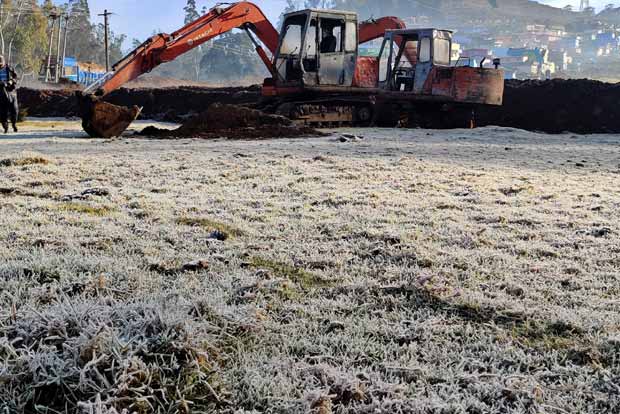Begin typing your search...
Delayed frosting gives chills to Nilgiris tea growers
Farmers rue being unprepared for weather phenomenon, which had a delayed start, that has now wilted tea leaves.

Chennai
Settling down climate concerns, frost, although delayed by many weeks this season, set in the mountain district of the Nilgiris, blanketing most parts of the region. This sudden onset of frost has, however, left tea growers distressed.
With about 45,000 hectares under cultivation, the Nilgiris earns the reputation of being the largest tea growing district in south India. The cultivation also provides direct employment to more than three lakh people by means of engaging in its processes of plucking tea leaves, transportation and in processing firms.
Frosting, being an annual phenomenon in the hilly district that usually sets in November and extends till the end of January, the tea growers harvest the leaves by mid-November before the onset of ground frost to prevent them from wilting. Scientists, however, mention the setting in of frost as having being unusually delayed this time.
This time around, farmers in the Nilgiris say that the tea gardens were flush with new growth, even after the recent harvest due to the absence of frosting. They weren’t also prepared for the weather phenomenon and were rather waiting to pluck the green leaves later. But the sudden onset of frost has begun to leave the tea plants dry.
Bracing up to the situation, the estate workers have now begun to pluck the green leaves to limit loss. Further, tea plantations are using sprinklers to prevent the leaves from wilting from the frost. The intense frost in Manjur and its surrounding areas has, however, already left a trail of destruction in the area’s tea gardens.
B Natarajan, a tea grower from Avalanche, counts himself lucky as frosting had just set in when he had finished another round of harvest. “It was my second harvest. But many others who were waiting to pluck the leaves were at a loss. I wish frosting doesn’t extend beyond its usual season time,” he said.
Tea growers say that the extent of damage caused by frosting could be assessed only in the coming days. “The frosting has set in delayed, and is likely to continue for the next few weeks. The overall impact of frosting on the tea gardens will be known only in the coming days,” said B Venugopal, founder of the Nilgiris Small Scale Tea Growers Awareness Centre.
Commenting it to be a peculiar season, the reasons have been cited to the monsoon extending till well into December also. On the delayed frosting, K Kannan, principal scientist, Indian Institute of Soil and Water Conservation Research Centre (ICAR), Udhagamandalam, said that though frost and chilly weather are a common phenomenon in the hills, it has been unusually delayed this time.
“Frosting has begun delayed now after about 50 years in the district. This time around, frosting may not be so severe like the previous years and there is less possibility for it to record in minus degrees Celsius,” he said.
Frosty Situation
- Frost usually sets in November and extends till January-end
- This year, it reportedly delayed in onset till the second week of January
- Tea plantations wilt in frost
Visit news.dtnext.in to explore our interactive epaper!
Download the DT Next app for more exciting features!
Click here for iOS
Click here for Android
Next Story



